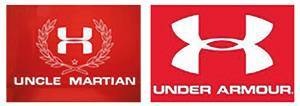In the wake of high-profile victories for Under Armour, New Balance, and Michael Jordan, courts in China have signaled a willingness to move quickly and decisively against infringers, including issuing preliminary injunctive relief and significant monetary damages. Although encouraging, it remains to be seen whether these decisions mark a sustained trend and, importantly, how they will impact would-be infringers and the marketplace going forward. In the meantime, the rulings impart important strategic considerations for brand owners tasked with balancing commercial and legal objectives in one of the world's most challenging IP forums.
Under Armour, Inc. v. Fujian Ting Fei Long Sporting Goods Co.
On 26 April 2016, which happened to be World Intellectual Property Day, a Chinese company named Fujian Ting Fei Long Sporting Goods Co. (Uncle Martian) launched its "Uncle Martian" brand of athletic footwear with a fashion show, showcasing shoes virtually identical to those offered by U.S. brand Under Armour (with Uncle Martian's label shamelessly pasted over Under Armour's branding in some cases). Uncle Martian's event and shoes prominently featured a logo strikingly similar to Under Armour's famous UA logo—a trademark that has achieved considerable international success and popularity, including in the China market. Shown below:

Before making its public debut, an Uncle Martian executive incorporated a company in Hong Kong under the name "Under Armour (China) Co, Limited" (this name was subsequently changed to "Uncle Martian (China) Co, Ltd" as the result of legal proceedings). These efforts were clearly intended as a means for Uncle Martian to disguise itself as Under Armour in China for purposes of selling clothing, franchise opportunities (an avenue it pursued heavily), and other commercial purposes. Uncle Martian also acquired a Chinese trademark registration covering for clothing in Class 25 (this registration has also been cancelled via legal proceedings). Uncle Martian attempted to rely on this registration, among other things, as a defence to its various infringing activities.
Under Armour quickly commenced legal action before the People's Higher Court of Fujian Province of the People's Republic of China (the "Higher Court") on 27 June 2016, seeking preliminary and permanent injunctions, monetary damages, and other relief against Uncle Martian's multitude of violations of China's trademark and unfair competition laws. On 2 November 2016, the Higher Court issued a preliminary injunction prohibiting Uncle Martian from manufacturing, selling, and advertising shoes bearing the marks that were the subject of Under Armour's preliminary injunction motion.
Following the preliminary injunction ruling, on 19 June 2017, the Higher Court issued a further ruling ordering Uncle Martian to permanently stop using the contested trademarks, destroy all infringing products, pay approximately US$300,000 (RMB 2,000,000) in damages, and publish a statement to "eliminate the adverse effect of Uncle Martian's infringement." The court's damages award was based on Uncle Martian's pre-launch activities as legal proceedings were instituted before Uncle Martian's products hit the shelves.
In its opinion, the Higher Court recognised the fame of Under Armour's mark—backed by considerable evidentiary submissions demonstrating Under Armour's extensive commercial and advertising activities in China. The Higher Court concluded that in view of the strength of Under Armour's mark, and the similarities of the parties' marks and products, consumers are likely to be confused.
Uncle Martian appealed the decision to the Supreme Court of China, where it remains pending. Oral arguments were held on 7 November 2017.
Michael Jeffrey Jordan v. Trademark Review and Appeal Board of the State Administration for Industry and Commerce of the People's Republic of China, and Jordan Sports Co., Ltd.
In 2012, one of the world's most iconic athletes and sports brands, Michael Jordan, instituted proceedings in China to cancel various trademark registrations for the mark QIAODAN in Chinese characters registered for sports equipment and other products (the QIAODAN Mark). These registrations were owned by a Chinese company based in the Fujian Province named Jordan Sports Co, Ltd (Qiaodan Sports). The QIAODAN mark is a Chinese transliteration of Michael Jordan's surname.
The China Trademark Review and Appeal Board (TRAB) denied Jordan's petitions for cancellation, finding that (1) although Jordan produced sufficient evidence establishing his fame in China, the QIAODAN Mark is distinguishable from "Michael Jordan" in Latin and Chinese characters; (2) "Jordan" is a common surname and, as such, Chinese consumers may not associate it with Michael Jordan exclusively; (3) Jordan and his business partner, Nike, typically used his full name together with the Jumpman logo to advertise and promote Air Jordan products in China; (4) the accused infringer owned registrations for the QIAODAN Mark and QIAODAN logo for shoes and clothing, which had developed a reputation in China via use and commercial success in China for many years; and (5) there was insufficient evidence demonstrating that QIAODAN was used by the Chinese media and other sources as an exclusive designation for Jordan. For these reasons, the TRAB considered confusion unlikely.
Jordan appealed to the Beijing Intermediate Court, and subsequently to the Beijing High Court. Both courts affirmed the TRAB's decision. Jordan then appealed to the People's Supreme Court of China (Supreme Court of China), where he finally achieved a different result. In particular, the Supreme Court of China ruled that Jordan owned prior rights in the Chinese transliteration of his surname, which rights are sufficient to prohibit Qiaodan Sports from registering the QIAODAN Mark without his consent.
In reaching this conclusion, the Supreme Court of China focused on whether: (1) Jordan could establish prior rights in the Chinese transliteration of his surname; (2) registration of the QIAODAN Mark without Jordan's consent would likely cause confusion; and (3) Qiaodan Sports acted in bad faith. The Supreme Court examined various media, including over 200 articles published in Chinese newspapers dating back to 1984, when Qiaodan Sports was established, and over 1,000 articles in Chinese sports magazines, websites, and other publications in considering whether QIAODAN had been used to refer to Jordan. Additionally, the Supreme Court attributed considerable weight to two surveys conducted by Jordan finding that a high percentage of consumers in China identified QIAODAN with Jordan, rather than Qiaodan Sports. The surveys also showed that a high percentage of consumers mistakenly believed that there was a relationship between Jordan and Qiaodan Sports, and had purchased Qiaodan Sports products believing Jordan was a brand ambassador for the company and/or that the products were offered under licence.
The Supreme Court explained that Chinese consumers frequently refer to Western celebrities by using a Chinese transliteration of part of the celebrity's name (not necessarily the full name). The Supreme Court commented that how Jordan and/or Nike use the Jordan name was not determinative and that the TRAB erred in requiring an "exclusive association" between the transliteration of Jordan and Michael Jordan.
As to the likelihood of confusion, in addition to survey evidence, evidence was submitted to show that Qiaodan Sports disclosed in an investment prospectus that "some consumers mistakenly associate [our] products with Michael Jordan, and we wish to remind the investors [of such risk]." Furthermore, Qiaodan Sports admitted that it was possible for consumers to associate its products with Jordan. Based on this evidence, among other things, the Supreme Court found confusion likely.
The Supreme Court also found bad faith. Among other things, Qiaodan Sports (1) registered the Chinese transliterations of the names of Jordan's children, and (2) registered a mark nearly identical to Nike Jumpman logo.
New Balance Trading (China) Co., Ltd. v. Shenzhen New Balance Sports Goods Co., Ltd. et al.
New Balance has long had a significant presence in China. In 2014, an individual named ZHENG Chaozhong incorporated a company under the name "USA New Bai Lun Sporting Goods Group Inc." (USA New Bai). USA New Bai purchased a Chinese trademark registration for the mark "N15" for clothing and shoes from a Chinese company. USA New Bai also sought registration in China for the marks "NEW BOOM" and "N".
In early 2015, Shenzhen New Balance Sports Goods Co (Shenzhen New Balance) was established with ZHENG as its sole shareholder. USA New Bai "licensed" Shenzhen New Balance the right to manufacture and sell products using the marks "N15", "NEW BOOM", and "N", ZHENG also operated a shoe factory in China and sold shoes through retail outlets in China.
New Balance sued these parties in China for trademark infringement and unfair competition.
In September 2016, the Suzhou Intermediate Court issued a preliminary injunction prohibiting the defendants from, among other things, manufacturing and selling shoes bearing the letter "N" and the stylised mark "N15". The defendants, however, continued advertising and selling shoes bearing these marks and, as a result, the court ordered them to pay the equivalent of US$250,000 in fines for violating the preliminary injunction.
The court subsequently issued rulings for New Balance, holding that the defendants infringed New Balance's "NB" logo by selling shoes under the stylised "N15" mark.
Furthermore, Shenzhen New Balance's use of "New Balance" to advertise and promote its shoes was deemed to be a clear infringement of New Balance's rights.
Lastly, the court found unfair competition based on New Balance's "trade dress." In reaching this determination, the court found that (1) the parties are direct competitors; (2) New Balance has invested significant marketing efforts towards promoting New Balance shoes in China; (3) New Balance shoes feature the slanting "N" logo; and (4) the logo has become distinctive through New Balance's use and significant marketing efforts, and is not functional. Consequently, the court concluded that the defendants' "N" logo appearing on the side of its shoes is likely to cause confusion among Chinese consumers as to the source, sponsorship, affiliation, or approval of its products.
The court granted New Balance the equivalent of U.S. $1.5m in damages and attorneys' fees, which has been reported as one of the largest trademark infringement awards granted in China to a foreign business. Before China passed a new trademark law in 2014, damages in trademark infringement cases often fell below U.S. $75,000. New legislation increased the statutory maximum amount to the equivalent of U.S. $450,000. In this case, the court awarded punitive damages to New Balance, as well as attorneys' fees, bringing the total award to U.S. $1.5m. The defendants were also ordered to publish apologies with a national news publisher to "eliminate the negative impact" of their unlawful conduct.
This decision marks a positive turn for New Balance in China. New Balance had previously been enjoined from using the Chinese transliteration of its mark, "Xin Bai Lun" in Chinese characters, and ordered to pay damages for its prior use of that mark in China.
Summary
While it is too early to know whether these decisions mark the beginning of a sustained trend in China, the outcomes are encouraging. In the meantime, these cases underscore the importance for brand owners to register their marks in various forms and across classes, build strong evidentiary records (for both court and TRAB proceedings), and prepare for appeals. It also behooves brand owners to monitor business name registrations (in China and Hong Kong) as these could be used as a means for facilitating an infringer's deceptive business practices. Of course, keeping an eye on the trademark register, evaluating pending applications and existing registrations for possible opposition/cancellation, and monitoring the market for infringements help towards facilitating an effective enforcement programme in China.
The content of this article is intended to provide a general guide to the subject matter. Specialist advice should be sought about your specific circumstances.

